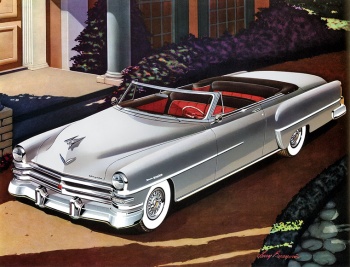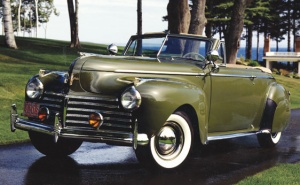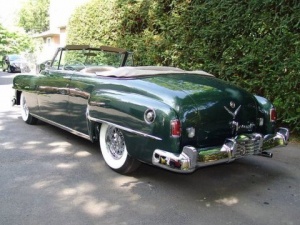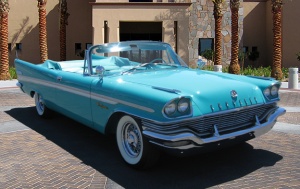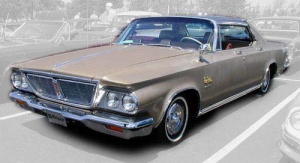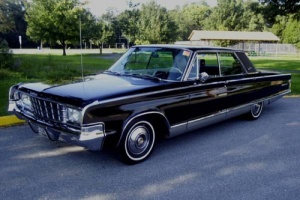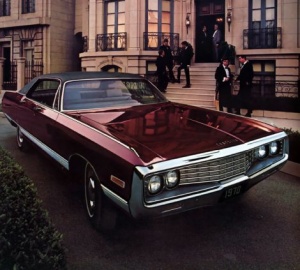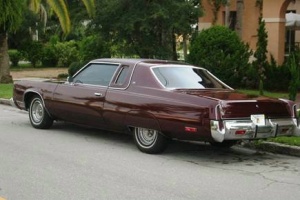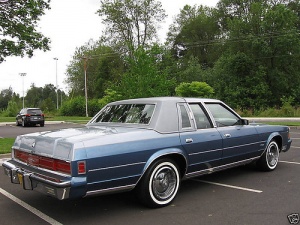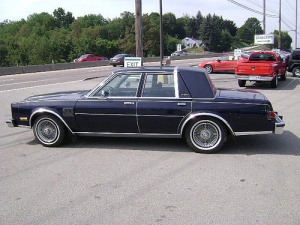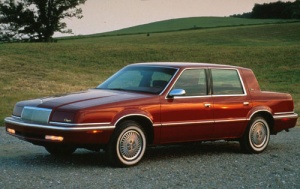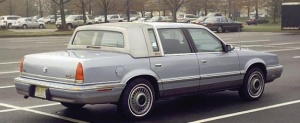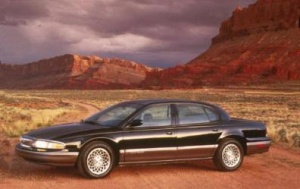Difference between revisions of "New Yorker"
Old Hippie (talk | contribs) |
|||
| Line 1: | Line 1: | ||
<!-- Please site your information references when applicable. There is a "Editing Help" link at the bottom of the page for people new to Wikis. Editing is actually very easy --> | <!-- Please site your information references when applicable. There is a "Editing Help" link at the bottom of the page for people new to Wikis. Editing is actually very easy --> | ||
| − | |||
[[Image:Chrysler 1953 new yorker convertible.jpg|thumb|350px|1953 Chrysler New Yorker]] | [[Image:Chrysler 1953 new yorker convertible.jpg|thumb|350px|1953 Chrysler New Yorker]] | ||
| + | |||
| + | {{Template:TopWiki}} | ||
New Yorker has almost always been the model name reserved for Chrysler's top of the line model -- Letter cars and when Imperial was not its own make excluded. The New Yorker name can be traced back to 1938, when Chrysler called it top of the line model the "New York Special". In 1939, the model name was changed to New Yorker, a name the stayed with Chrysler until the [[LHS]] was dropped in 1996. | New Yorker has almost always been the model name reserved for Chrysler's top of the line model -- Letter cars and when Imperial was not its own make excluded. The New Yorker name can be traced back to 1938, when Chrysler called it top of the line model the "New York Special". In 1939, the model name was changed to New Yorker, a name the stayed with Chrysler until the [[LHS]] was dropped in 1996. | ||
Revision as of 01:33, 10 May 2023
New Yorker has almost always been the model name reserved for Chrysler's top of the line model -- Letter cars and when Imperial was not its own make excluded. The New Yorker name can be traced back to 1938, when Chrysler called it top of the line model the "New York Special". In 1939, the model name was changed to New Yorker, a name the stayed with Chrysler until the LHS was dropped in 1996.
Contents
- 1 Model Predecessor
- 2 Model Successor
- 3 Related Models
- 4 Competition
- 5 Year by Year Changes, Production Numbers, and Cost:
- 5.1 1938-1948 Pre and Post War
- 5.2 1949-1956 The Keller Cars
- 5.3 1957-1961 Forward Look
- 5.4 1962-1964 Exner's Last
- 5.5 1965-1968 C-Body Slab Sides
- 5.6 1970-1973 C-Body Fuselage
- 5.7 1974-1978 C-Body The Broughams
- 5.8 1979-1981 R-Body
- 5.9 1982 M-Body
- 5.10 1983-1987 E-Body
- 5.11 1988-1993 C-Body
- 5.12 1994-1996 LHS-Body
- 6 Wiki Topic References:
- 7 Magazine References:
- 8 External Links
Model Predecessor
1937 Airflow Eight
Model Successor
Related Models
- Royal
- Windsor
- Newport
- Saratoga
- 300
- E-Class All but the 300 were Chrysler's lesser model of the New Yorker.
Competition
- Oldsmobile
- Buick
- Edsel
- Mercury
- Monarch (Canada)
- Nash
- Hudson
- Packard 200 / Clipper
- Kaiser
- Frazer
Year by Year Changes, Production Numbers, and Cost:
1938-1948 Pre and Post War
The Flat Head Straight 8cyl motor and Fluid Drive (Semi-Automatic) transmission were hardly leading edge technology, but were dependable. Like most cars immediately following WWII, the 1946-1948s were basically 1942 models with a different front end treatment.
Engines
- 323CI/135hp Flat Head
Transmissions
Specifications:
1949-1956 The Keller Cars
While the "Pontoon" front fenders disappeared for Chrysler's post war design, the cars had an unusually high roof-line, as dictated by Chrysler President K. T. Keller, who felt men wanted to be able to wear their hats while driving. In 1951 Chrysler answered Cadillac and Oldsmobile OHV V-8 engines with the introduction of the 331ci Hemi having 180hp.
Platform
Engines
- 323CI/135-hp Flat Head through 1953
- 331CI/180-hp Hemi beginning 1954
Transmissions
Specifications:
1957-1961 Forward Look
1957 introduced totally new Chryslers with Virgil Exner's huge fins on longer, wider, and lower bodies. 1957 saw the New Yorker getting the 392ci/345hp Hemi to replace the 354 hemi of 1956.
Platform
Engines
- 392CI/345hp Hemi Head for 1957-58
- 413-cid wedge head RB block 1959-61
Transmissions
Torqueflite 3-speed automatic
Specifications:
This Wiki is Under Construction, and can use your help!
Please take a moment to add any information you might have on this topic. It is through this type of Member collaboration that the MoparWiki will grow into being the Ultimate Mopar Infobase. The links contained in the Understanding Wikis box in the sidebar can help you get started.
1962-1964 Exner's Last
Platform
Engines
Transmissions
Specifications:
1965-1968 C-Body Slab Sides
Platform
Engines
Transmissions
Specifications:
1970-1973 C-Body Fuselage
Platform
Engines
Transmissions
Specifications:
1974-1978 C-Body The Broughams
Platform
Engines
Transmissions
Specifications:
1979-1981 R-Body
In 1979, the Chrysler full size cars were downsized from the C-Body to the R-Body, which was essentially a stretched B-Body. Also using the R-Body platform was the new Dodge St. Regis, a name borrowed from Chrysler, which replaced the full-size Dodge Royal Monacos previously on the C-Body. A late comer was the Plymouth Gran Fury of 1980.
Platform
Engines
Transmissions
Specifications:
1982 M-Body
Platform
Engines
Transmissions
Specifications:
1983-1987 E-Body
Platform
Engines
Transmissions
Specifications:
1988-1993 C-Body
Platform
Engines
Transmissions
Specifications:
1994-1996 LHS-Body
Platform
Engines
Transmissions
Specifications:
Wiki Topic References:
- Old Cars Weekly - October 15, 2009
Magazine References:
External Links
- MoparStyle C/D/R Forums
- MoparStyle F/J/M Forums
- MoparStyle FWD Forums
- Old Hippie's Mopar Forum
- New Yorker On-Line
- Chrysler's Official Web Site
Random Page | Longest Wikis | Oldest Wikis | Newest Images | Newest Wikis | List of Categories | List of Every Freakin Wiki
- Register to Edit
- It takes less than 5 minutes to request registration for editing, and we try to approve within 24 hours. Click the Register Link in the Top Bar.
- MoparWiki Help
- While editing Wikis may at first glance appear a little overwhelming, it really isn't. You will find this site's HELP (link found in the sidebar) to be very strong and easy to understand. The best way to start is with small edits and working on your user page -- and you will become a Pro in no time.
